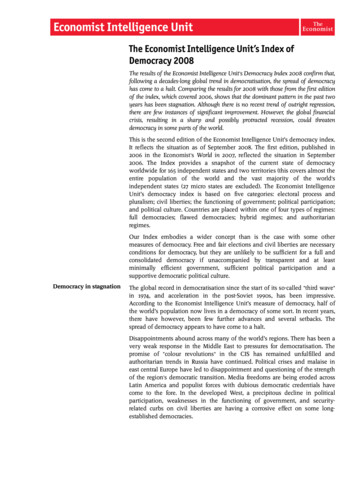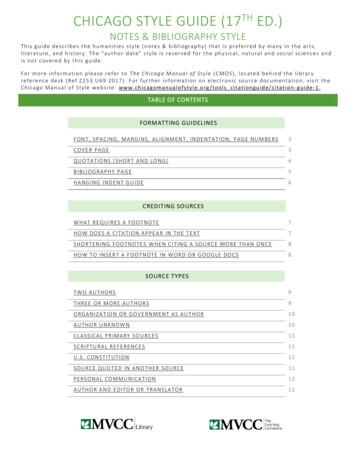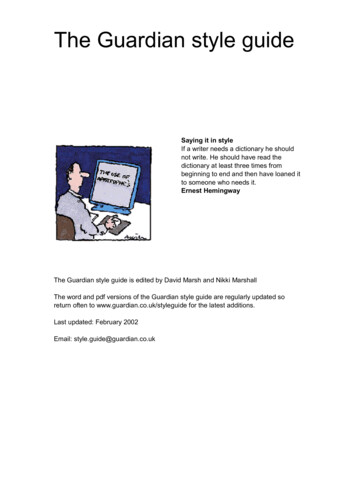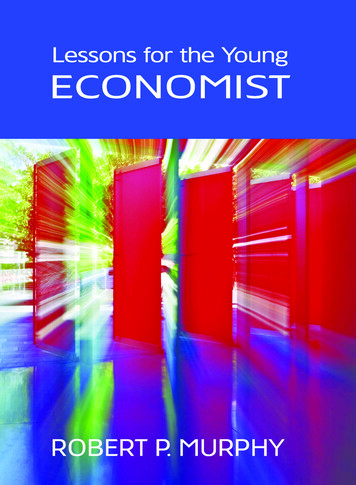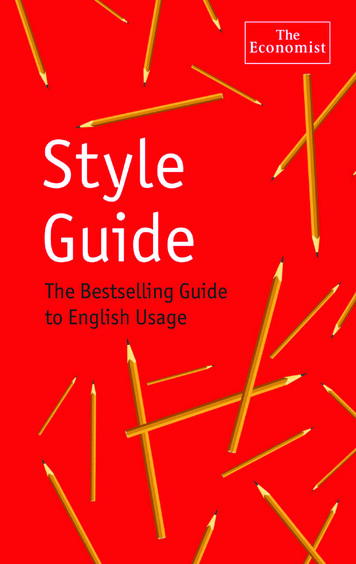
Transcription
STYLE GUIDE
OTHER ECONOMIST BOOKSGuide to Analysing CompaniesGuide to Business ModellingGuide to Business PlanningGuide to Economic IndicatorsGuide to the European UnionGuide to Financial MarketsGuide to Management IdeasNumbers GuideDictionary of BusinessDictionary of EconomicsInternational Dictionary of FinanceBrands and BrandingBusiness ConsultingBusiness EthicsBusiness MiscellanyBusiness StrategyChina’s StockmarketDealing with Financial RiskFuture of TechnologyGlobalisationHeadhunters and How to Use ThemSuccessful MergersThe CityWall StreetEssential DirectorEssential EconomicsEssential FinanceEssential InternetEssential InvestmentEssential NegotiationPocket World in Figures
STYLE GUIDE
T H E ECONOMIST IN ASSOCIAT ION WITHPRO FILE BO O KS LT DPublished by Profile Books Ltd,3a Exmouth House, Pine Street, London ec1r 0jhwww.profilebooks.comCopyright The Economist Newspaper Ltd, 1986, 1991, 1993, 1996, 1998,2000, 2001, 2003, 2005All rights reserved. Without limiting the rights under copyright reservedabove, no part of this publication may be reproduced, stored in orintroduced into a retrieval system or transmitted, in any form or by anymeans (electronic, mechanical, photocopying, recording or otherwise),without the prior written permission of both the copyright owner and theabove publisher of this bookThe greatest care has been taken in compiling this book.However, no responsibility can be accepted by the publishers or compilersfor the accuracy of the information presented.Typeset in EcoType by MacGuru Ltdinfo@macguru.org.ukPrinted in Great Britain byClays, Bungay, SuffolkA CIP catalogue record for this book is availablefrom the British LibraryISBN-10: 1 86197 916 9ISBN-13: 978 1 86197 916 2The paper this book is printed on is certified by the 1996 ForestStewardship Council A.C. (FSC). It is ancient-forest friendly.The printer holds FSC chain of custody SGS-COC-2061SGS-COC-2061
ContentsPrefaceviIntroduction1A note on editing4Part 15The essence of stylePart 2 American and British English143Part 3 Useful reference159Index242
PrefaceEvery newspaper has its own style book, a set of rules tellingjournalists whether to write e-mail or email, Gadaffi or Qaddafi,judgement or judgment. The Economist’s style book does this and a bitmore. It also warns writers of some common mistakes and encouragesthem to write with clarity and simplicity.All the prescriptive judgments in the style guide are directlyderived from those used each week in writing and editing TheEconomist.This ninth edition of the “The Economist Style Guide” is in threeparts. The first is based on the style book used by those who editThe Economist; it is largely the work of John Grimond, who has overthe years been Britain, American and foreign editor. The second, onAmerican and British English, describes some of the main differencesbetween the two great English-speaking areas, in spelling, grammar andusage.To make the style guide of greater general interest, Part 3 consistsof information drawing on the reference books published underThe Economist Books imprint and expanded to include handyreference material that might appeal to readers of The Economist.Such information is checked and new matter included for every newedition. For this edition the text in Part 3 has been extensively reviewedand reorganised to make the book more modern and up to date.Throughout the text, italic type is used for examples except wherethey are presented in lists, when the type is Roman, as this text is.Words in bold indicate a separate but relevant entry, that is, a crossreference. Small capitals are used only in the way The Economist usesthem, for which see the entries abbreviations and capitals.vi
IntroductionOn only two scores can The Economist hope to outdo its rivalsconsistently. One is the quality of its analysis; the other is the qualityof its writing. The aim of this book is to give some general advice onwriting, to point out some common errors and to set some arbitraryrules.The first requirement of The Economist is that it should be readilyunderstandable. Clarity of writing usually follows clarity of thought.So think what you want to say, then say it as simply as possible. Keepin mind George Orwell’s six elementary rules (“Politics and the EnglishLanguage”, 1946):123456Never use a metaphor, simile or other figure of speech which youare used to seeing in print (see metaphors).Never use a long word where a short one will do (see shortwords).If it is possible to cut out a word, always cut it out (seeunnecessary words).Never use the passive where you can use the active (see grammarand syntax).Never use a foreign phrase, a scientific word or a jargon word ifyou can think of an everyday English equivalent (see jargon).Break any of these rules sooner than say anything outrightbarbarous (see iconoclasm).Readers are primarily interested in what you have to say. By theway in which you say it you may encourage them either to read on orto give up. If you want them to read on:Do not be stuffy “To write a genuine, familiar or truly English style”,said Hazlitt, “is to write as anyone would speak in commonconversation who had a thorough command or choice of words orwho could discourse with ease, force and perspicuity setting asideall pedantic and oratorical flourishes.”Use the language of everyday speech, not that of spokesmen,lawyers or bureaucrats (so prefer let to permit, people to persons,buy to purchase, colleague to peer, way out to exit, present to gift,rich to wealthy, show to demonstrate, break to violate). Pomposity1
introductionand long-windedness tend to obscure meaning, or reveal the lackof it: strip them away in favour of plain words.Do not be hectoring or arrogant Those who disagree with you arenot necessarily stupid or insane. Nobody needs to be described assilly: let your analysis show that he is. When you express opinions,do not simply make assertions. The aim is not just to tell readerswhat you think, but to persuade them; if you use arguments,reasoning and evidence, you may succeed. Go easy on the oughtsand shoulds.Do not be too pleased with yourself Don’t boast of your owncleverness by telling readers that you correctly predicted somethingor that you have a scoop. You are more likely to bore or irritatethem than to impress them.Do not be too chatty Surprise, surprise is more irritating thaninformative. So is Ho, ho and, in the middle of a sentence, wait forit, etc.Do not be too didactic If too many sentences begin Compare,Consider, Expect, Imagine, Look at, Note, Prepare for, Remember orTake, readers will think they are reading a textbook (or, indeed, astyle book).Do your best to be lucid (“I see but one rule: to be clear”, Stendhal)Simple sentences help. Keep complicated constructions andgimmicks to a minimum, if necessary by remembering the NewYorker’s comment: “Backward ran sentences until reeled the mind.”The following letter from a reader may be chastening:SirAt times just one sentence in The Economist can give us hours ofenjoyment, such as “Yet German diplomats in Belgrade failed topersuade their government that it was wrong to think that thethreat of international recognition of Croatia and Slovenia woulditself deter Serbia.”During my many years as a reader of your newspaper, I havedistilled two lessons about the use of our language. Firstly, it isusually easier to write a double negative than it is to interpret it.Secondly, unless the description of an event which is consideredto be not without consequence includes a double or higher-order2
introductionnegative, then it cannot be disproven that the writer has neglectedto eliminate other interpretations of the event which are notsatisfactory in light of other possibly not unrelated events whichmight not have occurred at all.For these reasons, I have not neglected your timely reminderthat I ought not to let my subscription lapse. It certainly cannot besaid that I am an unhappy reader.Willard DunningMark Twain described how a good writer treats sentences: “Attimes he may indulge himself with a long one, but he will makesure there are no folds in it, no vaguenesses, no parentheticalinterruptions of its view as a whole; when he has done with it, itwon’t be a sea-serpent with half of its arches under the water; itwill be a torch-light procession.”Long paragraphs, like long sentences, can confuse the reader.“The paragraph”, according to Fowler, “is essentially a unit ofthought, not of length; it must be homogeneous in subject matterand sequential in treatment.” One-sentence paragraphs should beused only occasionally.Clear thinking is the key to clear writing. “A scrupulouswriter”, observed Orwell, “in every sentence that he writes willask himself at least four questions, thus: What am I trying to say?What words will express it? What image or idiom will make itclearer? Is this image fresh enough to have an effect? And he willprobably ask himself two more: Could I put it more shortly? Have Isaid anything that is avoidably ugly?”Scrupulous writers will also notice that their copy is editedonly lightly and is likely to be used. It may even be read.3
A note on editingEditing has always made a large contribution to The Economist’sexcellence. It should continue to do so. But editing on a screen isbeguilingly simple. It is quite easy to rewrite an article withoutrealising that one has done much to it at all: the cursor leaves notrace of crossings-out, handwritten insertions, rearranged sentences orreordered paragraphs. The temptation is to continue to make changesuntil something emerges that the editor himself might have written.One benefit of this is a tightly edited newspaper. One cost is a certainsameness. The risk is that the newspaper will turn into a collection of70 or 80 articles which read as though they have been written by nomore than half a dozen hands.The Economist has a single editorial outlook, and it is anonymous.But it is the work of many people, both in London and abroad,as its datelines testify. If the prose of our Tokyo correspondent isindistinguishable from the prose of our Nairobi correspondent, readerswill feel they are being robbed of variety. They may also wonderwhether these two people really exist, or whether the entire newspaperis not written in London.The moral for editors is that they should respect good writing.That is mainly what this style sheet is designed to promote. It is notintended to impose a single style on all The Economist’s journalists. Awriter’s style, after all, should reflect his mind and personality. So longas they are compatible with The Economist’s editorial outlook, and solong as the prose is good, editors should exercise suitable self-restraint.Remember that your copy, too, will be edited. And even if you thinkyou are not guilty, bear in mind this comment from John Gross:Most writers I know have tales to tell of being mangled byeditors and mauled by fact-checkers, and naturally it is theflagrant instances they choose to single out - absurdities,outright distortions of meaning, glaring errors. But most ofthe damage done is a good deal less spectacular. It consists ofsmall changes (usually too boring to describe to anyone else)that flatten a writer’s style, slow down his argument, neutralisehis irony; that ruin the rhythm of a sentence or the balanceof paragraph; that deaden the tone that makes the music. Isometimes think of the process as one of “desophistication”.John Grimond4
partpart 11the essence of style
aa or the see grammar and syntax.abbreviationsUnless an abbreviation (or acronym) is so familiar that it is usedmore often than the full form:aids bbc cia eu fbi hiv imf nato ngo oecd unescoor unless the full form would provide little illumination – awacs,dna – write the words in full on first appearance: thus, TradesUnion Congress (not tuc). If in doubt about its familiarity, explainwhat the organisation is or does. After the first mention, try not torepeat the abbreviation too often; so write the agency rather thanthe iaea, the party rather than the kmt, to avoid spattering thepage with capital letters. There is no need to give the initials of anorganisation if it is not referred to again.Do not use spatterings of abbreviations and acronyms simplyin order to cram more words in; you will end up irritating readersrather than informing them. An article in a recent issue of TheEconomist contained the following:cia dci dni dod dvd fbi nctc nsaThe article immediately following had:ctac cx dis fco gchq it jic jtac mi5 mi6 mp scopewmdSome of these are well known to most readers and can readilybe held in the mind. But unfamiliar abbreviations may obligethe reader to be constantly referring back to the first use. Better torepeat some names in full, or to write the agency, the committee, theparty, etc, than to allow an undisciplined proliferation. And preferchief executive or boss to ceo.6
abbreviationsampersands should be used:1 when they are part of the name of a company:Procter & Gamble Pratt & Whitney2 for such things as constituencies where two names arelinked to form one unit:The rest of Brighouse & Spenborough joins with the Batleypart of Batley & Morley to form Batley & Spen.The area thus became the Pakistani province of Kashmir andthe Indian state of Jammu & Kashmir.3 in r&d and s&l.definite article If an abbreviation can be pronounced – efta,nato, unesco – it does not generally require the definitearticle. Other organisations, except companies, should usuallybe preceded by the:the bbc the kgb the nhs the niesr the unhcrelements do not take small caps when abbreviated:carbon dioxide is CO2chlorofluorocarbons are CFCslead is Pbmethane is CH4the oxides of nitrogen are generally NOXDifferent isotopes of the same element are distinguishedby raised (superscript) prefixes:carbon-14 is 14Chelium-3 is 3Heheadings, cross-heads, captions, etc In headings, rubrics, crossheads, footnotes, captions, tables, charts (including sources),use ordinary caps, not small caps.initials in people’s and companies’ names take points (with aspace between initials and name, but not between initials). Ingeneral, follow the practice preferred by people, companiesand organisations in writing their own names.F.W. de Klerk E.I. Du Pont de Nemours V.P. Singh F.W. Woolworth7
part 1: the essence of stylejunior and senior Spell out in full (and lower case) junior andsenior after a name:George Bush junior George Bush seniorlower case Abbreviate:kilograms (not kilogrammes) to kgkilometres per hour to kphkilometres to kg (or kilos) and kmmiles per hour to mphUse lower case for kg, km, lb (never lbs), mph and othermeasures, and for ie, eg, which should both be followedby commas. When used with figures, these lower-caseabbreviations should follow immediately, with no space:11am 4.30pm 15kg 35mm 100mph 78rpm.Two abbreviations together, however, must be separated:60m b/d. Use b/d not bpd as an abbreviation for barrels per day.MPs Except in British contexts, use mp only after first spellingout member of Parliament in full (in many places an mp is amilitary policeman).Members of the Scottish Parliament are msps.Members of the European Parliament are meps (not Euro-mps).organisationsefta is the European Free Trade Association.ida is the International Development Association.nafta is the North American Free-Trade Agreement.the fao is the Food and Agriculture Organisation.the fda is the Food and Drug Administration.the plo is the Palestine Liberation Organisation.pronounceable abbreviationsAbbreviations that can be pronounced and are composed ofbits of words rather than just initials should be spelt out inupper and lower UnicefUnisomUnprofor
abbreviationsAnd Trips (trade-related aspects of intellectual property rights).There is generally no need for more than one initialcapital letter, unless the word is a company or a trade name:MiG, ConsGold.ranks and titles Do not use Prof, Sen, Col, etc. Lieut-Colonel andLieut-Commander are permissible. So is Rev, but it must bepreceded by the and followed by a Christian name or initial:the Rev Jesse Jackson (thereafter Mr Jackson).scientific units named after individuals Most scientific units,except those of temperature, that are named after individuals,should be set in small capitals, though any attachmentsdenoting multiples go in lower case:ampère is a or ampöhm is owatt is wkilowatt, 1,000 watts, is kwmilliwatt, one-thousandth of a watt, is mwmegawatt, 1m watts, is mwsmall caps usage1In the text abbreviations, whether they can bepronounced as words or not:gnp gdp fob cif a-levels d-marks t-shirts x-rays2345should be set in small capitals, with no points, unless theyare currencies like Nkr or SFr, elements like H and O ordegrees of temperature like F and C.Brackets, apostrophes and all other typographical furnitureaccompanying small capitals are generally set in ordinaryroman, with a lower-case s (also roman) for plurals andgenitives: ious, mps’ salaries, sdrs, etc.Ampersands are set as small capitals, as are numerals andany hyphens attaching them to a small capital (see alsobelow). Thus:r&d a23 m1 f-16ad and bc (76ad, 55bc): figures and numbers thus joinedshould both be set in small capitals.Abbreviations that include upper-case and lower-case9
part 1: the essence of style6letters must be set in a mixture of small capitals androman: bphils, phds.Do not use small caps for roman numerals.writing out upper-case abbreviations Most upper-caseabbreviations take upper-case initial letters when written infull. The lso is the London Symphony Orchestra. However,there are exceptions:cap but common agricultural policyemu but economic and monetary uniongdp but gross domestic productpsbr but public-sector borrowing requirementvlsi but very large-scale integrationmiscellaneous Spell out:page pages hectares milesRemember, too, that the V of hiv stands for virus, so donot write hiv virus.See measures in Part 3.absent In Latin absent is a verb meaning they are away. In English it iseither an adjective (absent friends) or a verb (to absent yourself). It isnot a preposition meaning in the absence of.accents On words now accepted as English, use accents only whenthey make a crucial difference to pronunciation:café cliché communiqué exposé façade soupçonBut: chateau decor elite feted naiveThe main accents and diacritical signs liquegrand’mèrebête noireLänder, Österreich (Austria)françaisseñor, São Paulo
accents affirmative actionIf you use one accent (except the tilde – strictly, a diacriticalsign), use all:émigré mêlée protégé résuméPut the accents and diacritical signs on French, German,Spanish and Portuguese names and words:José Manuel BarrosoFederico PeñaFrançoise de PanafieuWolfgang SchäubleLeave accents and diacritical signs off other foreign names.Any foreign word in italics should, however, be given itsproper accents. (See also italics.)acronym A pronounceable word, formed from the initials of otherwords, like radar or nato. It is not a set of initials, like the bbc orthe imf.actionable means giving ground for a lawsuit. Do not use it to meansusceptible of being put into practice: prefer practical.active, not passive Be direct. A hit B describes the event moreconcisely than B was hit by A.adjectives and adverbs see grammar and syntax, punctuation.adjectives of proper nouns see grammar and syntax, punctuation.address What did journalists and politicians do in the days, not solong ago, when address was used as a verb only before objectssuch as audience, letter, ball, haggis and, occasionally, themselves?Questions can be answered, issues discussed, problems solved,difficulties dealt with. See clichés.aetiology is the science of causation, or an inquiry into something’sorigins. Etiolate is to make or become pale for lack of light.affect the verb, means to have an influence on, as in the novel affectedhis attitude to immigrants. See also effect.affirmative action is a euphemism, uglier even than human-rightsabuses and more obscure even than comfort station, with little tobe said for it. It is too late to suppress it altogether and perhaps11
part 1: the essence of styletoo soon to consign it to the midden of civil-rights studies, but tryto avoid it as much as possible. If you cannot escape it, put it inquotation marks on first mention and, unless the context makesits meaning clear, explain what it is. You may, however, find thatpreferential treatment, job preferment or even discrimination servejust as well as alternatives. See euphemisms.affordable By whom? Avoid affordable housing, affordable computersand other unthinking uses of advertising lingo.Afghan names see names.aggravate means make worse, not irritate or annoy.aggression is an unattractive quality, so do not call a keen salesman anaggressive one (unless his foot is in the door).agony column Remember that when Sherlock Holmes perused this, itwas a personal column. Only recently has it come to mean letters toan agony aunt.agree Things are agreed on, to or about, not just agreed.alibi An alibi is the fact of being elsewhere, not a false explanation.alternate, alternative Alternate (as an adjective) means every other.Alternative (as a noun), strictly, means one of two, not one ofthree, four, five or more (which may be options). As an adjective,alternative means of two (or, loosely, more) things, or possible as analternative.Americanisms Many American words and expressions have passedinto the language; others have vigour, particularly if used sparingly.Some are short and to the point, so for example prefer lay off tomake redundant.Spat and scam, two words beloved by some journalists, havethe merit of brevity, but so do row and fraud; squabble and swindlemight sometimes be used instead. But many words favoured inAmerican English usage are unnecessarily long, so use:and not additionallythe army not the military (noun)car not automobile12
Americanismscompany not corporationcourt not courtroom or courthousedistrict not neighbourhoodnormality not normalcyoblige not obligaterocket not skyrocketspeciality not specialtystocks not inventories, unless there is the risk of confusion withstocks and shares)transport not transportationOther Americanisms are euphemistic or obscure, so avoid:affirmative actionball gamesend runspoint menrookiesstand-offadverbs Put adverbs where you would put them in normalspeech, which is usually after the verb (not before it, whichusually is where Americans put them).avoiding nouning adjectives Similarly, do not noun adjectivessuch as:advisory – prefer warningcentennial – prefer centenaryinaugural – prefer inaugurationmeet (verb) – meeting is betterspend (verb) – spending is preferableavoiding verbing and adjectiving nouns Try not to verb nounsor to adjective them. So do not:access filesauthor books (still less co-author them)critique style guidesgun someone down, use shoothaemorrhage red ink (haemorrhage is a noun)let one event impact anotherloan moneypressure colleagues (press will do)progress reportssource inputstrial programmes13
part 1: the essence of styleAvoid parenting (or using the word) and parenting skills.(See also grammar and syntax.)And though it is sometimes necessary to use nouns asadjectives, there is no need to call:an attempted coup a coup attempta suspected terrorist a terrorist suspectthe Californian legislature the California legislatureVilest of all is the habit of throwing together several nounsinto one ghastly adjectival reticule:Texas millionaire real-estate developer and failed thriftentrepreneur Hiram Turnipseed .coining words Avoid coining verbs and adjectives unnecessarily.Instead of:dining experiences and writing experiences: use dining andwritingdownplaying criticism, you can play it down (or perhapsminimise it)skiing Vail, ski at Vailupcoming and ongoing are better put as forthcoming andcontinuingWhy outfit your children when you can fit them out?old-fashioned terms Some American expressions that were oncecommon in English English (and some still used in ScottishEnglish) now sound old-fashioned to most British ears. Soprefer:clothes or clothing to apparel or garmentsdoctors to physiciansgot to gottenlawyers to attorneysoften to oftentimesover or too to overlyoveruse of American words Do not feel obliged to followAmerican fashion in overusing such words as:constituency – try supportersgubernatorial – this means “relating to a governor”perception – try belief or view14
Americanismsrhetoric (of which there is too little, not too much) – try languageor speeches or exaggeration if that is what you meansome differences In an American context you may run for office(but please stand in countries with parliamentary systems) andyour car may sometimes run on gasoline instead of petrol. Butif you use corn in the American sense you should explain thatthis is maize to most people (unless it is an old chestnut).Slate can also mean abuse (as a verb) but does not, inBritain, mean predict, schedule or nominate. And if you mustuse American expressions, use them correctly (a rain-checkdoes not imply checking on the weather outside).In Britain:Cars are hired, not rented, and are left in car parks, not parkinglots.City centres are not central cities.Companies: call for a record profit if you wish to exhortthe workers, but not if you merely predict one. And donot post it if it has been achieved. If it has not, look forsomeone new to head, not head up, the company.Countries, nations and states: London is the country’s capital,not the nation’s. If you wish to build a nation, you willbind its peoples together; if you wish to build a state, youwill forge its institutions.Deep: make a deep study or even a study in depth, but not anin-depth study.Ex-servicemen are not necessarily veterans.Football for most people is a game – you do not have to call ita sport – that Americans call soccer.Do not figure out if you can work out.Fresh should be used of vegetables, not teenagers.Grow a beard or a tomato but not a company (or indeed asalesman: the Financial Times reported on August 8th2003 that bmw was “to grow its own car salesmen”).Hikes are walks, not increases.Hospital: when we are seriously ill we are in hospital, not inthe hospital, still less hospitalised.Do not use likely to mean probably.Make a rumpus rather than a ruckus, be rumbustious ratherthan rambunctious, and snigger rather than snicker.On-site inspections are allowed, but not on-train teams or in-earheadphones.15
part 1: the essence of styleOutside America, nowadays, you stay outside the door, notoutside of it.Programme: you may program a computer but in all othercontexts the word is programme.Keep a promise, rather than deliver on it.Raise cattle and pigs, but children are (or should be) brought up.Regular is not a synonym for ordinary or normal: Mussolinibrought in the regular train, All-Bran the regular man; it isquite normal to be without either.A religious group sounds better than a faith-based organisation.Scenarios are best kept for the theatre, postures for the gym,parameters for the parabola.School: children are at school, not in it.Do not task people, or meet with them.Throw stones, not rock.Trains run from railway stations, not train stations. The peoplein them, and on buses, are passengers, not riders.Use senior rather than ranking.And only the speechless are dumb, the well-dressed (and afew devices) smart and the insane mad.tenses Choose tenses according to British usage, too. In particular,do not fight shy – as Americans often do – of the perfect tense,especially where no date or time is given. Thus:Mr Bush has woken up to the danger is preferable to Mr Bushwoke up to the danger, unless you can add last week or when heheard the explosion.Do not write Your salary just got smaller or I shrunk thekids. In British English Your salary has just got smaller and I’veshrunk the kids.See also adjectives of proper nouns, euphemisms, grammar andsyntax, and Part 2.aircraft see hyphens and italics.among and between Some sticklers insist that, where divisionis involved, among should be used where three or more areconcerned, between where only two are concerned. So:The plum jobs were shared among the Socialists, the Liberals and16
among and between anonthe Christian Democrats, while the president and the vice-presidentdivided the cash between themselves.This distinction is unnecessary. But take care with between. Tofall between two stools, however painful, is grammatically acceptable;to fall between the cracks is to challenge the laws of physics.Prefer among to amongst.an should be used before a word beginning with a vowel sound (anegg, an umbrella, an MP) or an h if, and only if, the h is silent (anhonorary degree). But a European, a university, a U-turn, a hospital,a hotel. Historical is an exception: it is preceded by an, the hremaining silent.anarchy means the complete absence of law or government. It may beharmonious or chaotic.animals For the spelling of the Latin names of animals, plants, etc, seeLatin names.annus horribilis, annus mirabilis Annus horribilis is often used,presumably in contrast to annus mirabilis, to describe an awfulyear, for example by Queen Elizabeth in 1992 (the year of herdaughter’s divorce, the separation of the Duke and Duchess ofYork and a fire at Windsor Castle) and by Kofi Annan in 2004 (ayear of scandal and controversy at the United Nations). It servesits purpose well, but it should be noted that annus mirabilisoriginally meant much the same thing: 1666, of which it was firstused, was the year of the great fire of London and the secondyear of the great plague in England, although English spirits werelifted a bit by a defeat of the Dutch navy. Physicists, however,have latterly used the term to describe 1932, the year in whichthe neutron was discovered, the positron identified and theatomic nucleus first broken up art
The Economist Books imprint and expanded to include handy reference material that might appeal to readers of The Economist. Such information is checked and new matter included for every new edition. For this edition the text in Part 3 has been extensively reviewed and




